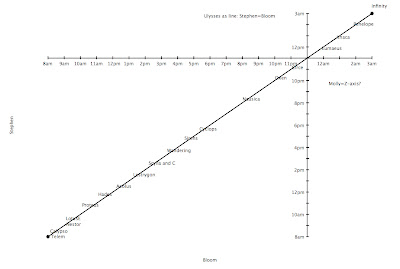I know this is kind of Jorn Barger's thing, but I have some Ulysses conjectures of my own.
Any criticism is very welcome.
-Haines is a hobbyist hunter, has a gun, and his nightmare was of a black panther. That he would reflexively grab his gun is not a long stretch.
-Stephen asks Mulligan where Haines' guncase is.
-Stephen is freaked out that morning, and avoids Haines until they absolutely have to talk;
-There is talk of a gun going off as Joyce's reason for leaving Martello tower, so the fictional account may also use that same event;
-Haines is a bit of a nutcase;
2. The various styles of Ulysses are mentally real (to the characters).
-The initial episodes are not stylistically crazy because, as Stephen says, "We're always tired in the morning...And it is rather long to tell"(U 18) Once they get some mental energy, the craziness starts.
-Aeolus expresses the minds ability to generalize-hence the headlines;
-Lestrygonians is sluggish and depressed until Bloom eats lunch, the style then picks up;
-The musical combinations of Sirens are easy to see as real mental events;
-The epic interludes of Cyclops are the only problem with this conjecture, since Bloom is not present for a few of them, though, the drunken patrons of the bar could be thinking these overblown descriptions.
-Nausicaa is all theatre of the mind;
-The styles of Oxen reflect the attitudes of the characters narrating;
-Circe is definitely mentally real, all hallucinations;
-Eumeus is the tired but lucid style of the exhausted mind, like a college kid writing a paper till 4am;
-Ithaca is a personal catechism, when the mind is trying to sort out the day;
-Penelope is mentally real just like Proteus was mentally real;
3. Ulysses was written as a memory device after the theories of Giordano Bruno and Thomas Aquinas.
-The styles and symbols given by the schema support the symbolism of Giordano Bruno's system;
-Understanding the book requires a very good memory of the text;
-The unusual symbolism supports Aquinas' theories on how to use symbols for memory;
-Joyce was veeery careful with his words. In fact a single word on page 23 cannot be changed because it occurs 174 pages later.
-Joyce himself was a practitioner of the memory techniques of Bruno and Aquinas (and possibly others). He is documented to have memorized texts as a hobby.
This theory deserves a little more study.
4. Macintosh is a figment of Blooms imagination. Gerty is real.
-No one else sees him;
-If Macintosh is real, then he is stalking Bloom. This is not likely;
-Not likely that Gerty's consciousness could be mimicked in Bloom's mind
-Others interact with Gerty;
5. Stephen does have his glasses on Bloomsday.
-He helps Sargent with his algebra, teaches class, calls on his students, reads Deasy's letter...etc. If Stephen's eyes were as bad as he proposes, these things would be very problematic.
-He's worn glasses his entire life, wouldn't people notice if he's not wearing them?
-The quote is: "Lynx eye. Must get glasses. Broke them yesterday. Sixteen years ago."(U560), This seems to support that either he broke his glasses yesterday, or that he broke them yesterday sixteen years ago. The "Must get glasses" part is problematic, but then again so is the fact that Stephen is able to read without his glasses.
6. Bloom is actively setting Molly up with other guys.
-Canvassing ads cannot possibly bring in that much money;
-The second hand clothes business Molly had also supports this;
-Joyce himself tried to set Nora up with other men, in order to see how he himself would react (but, for art or pleasure?)
-This theory may be involved with #7.
7. Bloom is involved in some other business, possibly something to do with the Freemasons.
-Lots of evidence that Bloom is a Freemason;
-He seems well off as we know from Ithaca when his drawers are catalogued;
-The Royal Hungarian Lottery tickets and the stocks he owns;
-Also, it is a little weird that Bantom Lyons assumes that Bloom is giving him a tip in Lotus Eaters, could it be because Bloom has a history in this type of business?
8. Stephen and Mulligan do not have a confrontation at Westland Row station.
-In the three hours that Stephen and Bloom are both present, not once is an altercation mentioned;
-Stephen's hand hurts. If he had hurt his hand hitting Mulligan, wouldn't Mulligan have hit back? And if Mulligan had fought Stephen he would have done worse than merely hurt Stephen's hand;
The evidence only points at Mulligan and Haines merely avoiding Stephen at the station.
Also:
-Mulligan already has the key to the tower and money from Stephen for pints, so there's no motive;
-Haines has nothing against Stephen;
-Stephen has not offended Mulligan to the point that Mulligan would hit Stephen;
-Mulligan may have offended Bloom, but Stephen has no reason to defend Bloom's honour. Indeed Stephen is openly opposed to an acquaintance with Bloom during Eumeus and Ithaca.
9. Stephen, at some point in the interval between Oxen and the end of Circe, vomits.
-He has been drinking since around noon;
-He has not eaten since breakfast, which consisted only of tea, bread, and rashers (supposing he ate it all, which is also not likely)
-He mixes his drinks: beer, liquor (Absinthe), and may have been drugged;
-He goes nuts in Circe, dances in circles, gets punched in the face, much agitation;
Considering all of the above, and the fact that he is sober by the end of Eumeus and through Ithaca, how could he not vomit?

